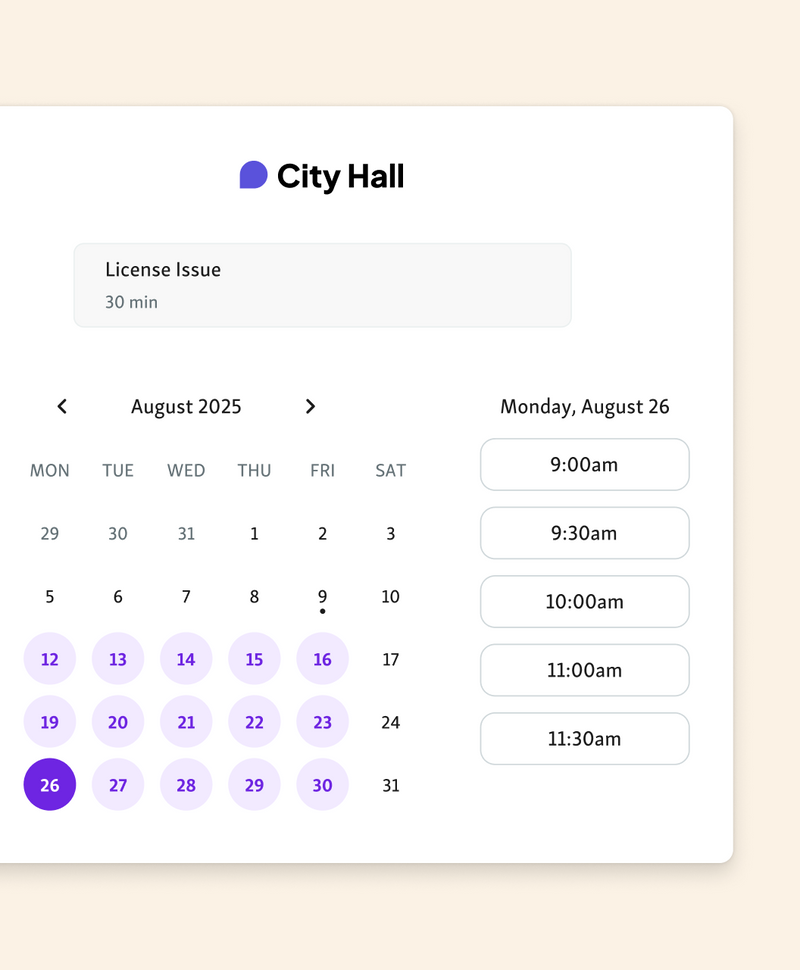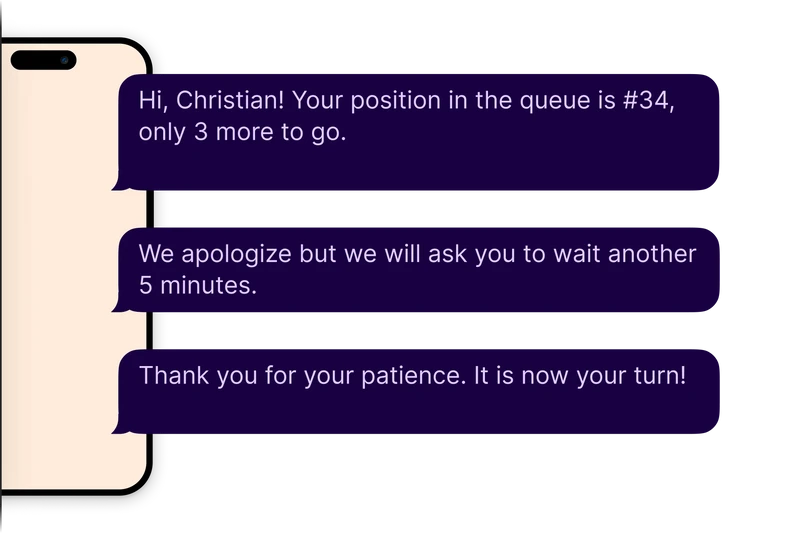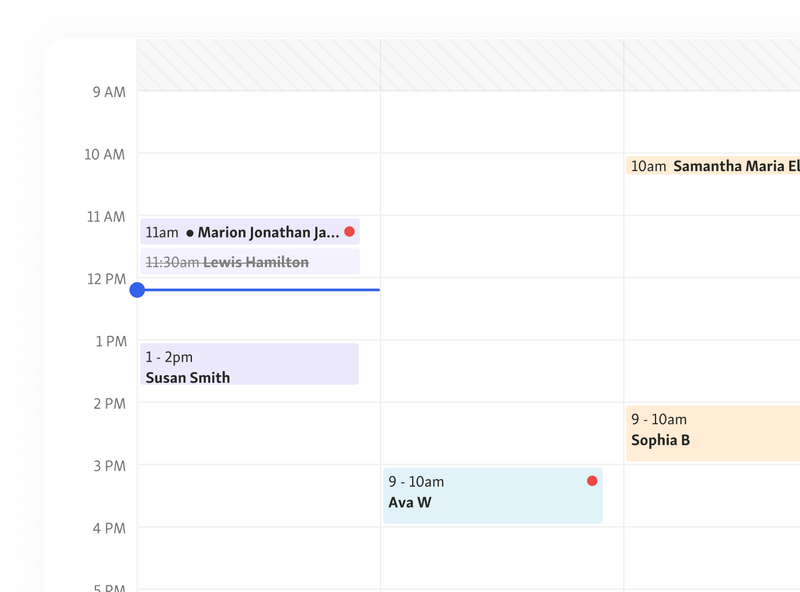Efficient appointment systems are essential in local government services, ensuring streamlined operations and enhanced citizen satisfaction. These services form the backbone of our communities, offering vital functions such as public health, education, and safety.
However, without effective appointment management, citizens often face prolonged wait times, leading to frustration and decreased trust in public institutions.
Implementing robust appointment systems can significantly reduce delays and improve accessibility, fostering a more responsive government.
In this blog, we'll explore the top features to consider when selecting an appointment system for local government services, aiming to enhance efficiency and public satisfaction.
Top 7 Features to Look for in Appointment Systems for Local Government
Appointment systems for local government services are designed to simplify the process of scheduling and managing appointments, ultimately improving service delivery. Below are the top features that make appointment systems effective and beneficial for both service providers and the public.
1. Easy-to-Use Interface
A user-friendly interface is vital for both citizens and government employees. It makes the process of booking appointments straightforward, ensuring that individuals with varying levels of technical expertise can use the system without confusion.
A simple, clean design helps reduce frustration and ensures that the process is both efficient and effective for all users.
Benefits:
Simplifies the booking process, leading to fewer mistakes.
Reduces time spent on managing appointments manually.
Enhances citizen satisfaction by making the process faster and more intuitive.
If a senior citizen is trying to book an appointment for a public health service, a complicated interface could lead to frustration, mistakes, or missed appointments.
A simple, user-friendly interface helps avoid this problem, allowing the senior to book their appointment easily, while the staff can focus on providing service instead of troubleshooting the system.
2. Online Booking and Management
Online appointment booking has become a must-have feature for local government services, ensuring both convenience and accessibility for citizens.
By enabling individuals to book, reschedule, or cancel appointments online, the system minimizes administrative workload and provides a better user experience.

With online booking, citizens can manage their own schedules at their convenience, without having to rely on phone calls or in-person visits.
Benefits:
Reduces the need for phone calls, cutting down on time spent by government staff answering appointment-related queries.
Minimizes office foot traffic, leading to more efficient in-person services.
Empowers citizens to independently manage their appointments, promoting a sense of autonomy.
For instance, a local government office that handles a large number of public service appointments might face long hold times and overburdened staff if citizens have to call in to book, reschedule, or cancel appointments.
With an efficient online booking system, citizens can easily manage their appointments at any time, reducing phone traffic and allowing staff to focus on in-person assistance. This enhances the overall citizen experience and improves office efficiency.
3. Automated Reminders and Notifications
Automated reminders are essential in reducing no-shows and improving appointment adherence. Government offices often deal with high volumes of appointments, and without automated reminders, citizens may forget their scheduled times, leading to inefficiency and wasted resources.
By automating reminders, government offices ensure that citizens are constantly updated and aware of their upcoming appointments, reducing the likelihood of cancellations or rescheduling at the last minute.
Benefits:
Reduces the need for staff intervention.
Ensures citizens are reminded about their appointments.
Decreases last-minute cancellations.
Tools like Qminder send automated SMS reminders to citizens about their upcoming appointments, making sure they are well-informed and reducing the chance of missed appointments. This leads to better attendance rates and more efficient appointment management.

4. Multi-Channel Support (Phone, Email, SMS)
Providing multiple communication channels for booking and managing appointments ensures that every citizen, regardless of their technical proficiency or preference, can access the system.
Not all citizens are comfortable with online booking, and some may prefer traditional methods like phone calls or emails. Multi-channel support makes the system inclusive and adaptable, enhancing overall accessibility for a broader demographic.
Benefits:
Increases accessibility for citizens with varying levels of tech-savviness.
Ensures more users can engage with the system in their preferred communication method.
Reduces barriers to access, ensuring no one is left out due to limited options.
With Qminder, citizens can book or manage their appointments through multiple channels, including phone calls, SMS, and email. This flexibility allows individuals who may not be familiar with online portals or prefer more traditional methods to easily interact with the system, improving accessibility and ensuring a smoother experience for all.
5. Integration with Existing Systems
An appointment management system for county governments that integrates with other existing local government systems, such as CRM tools, calendar apps, and databases, ensures seamless coordination.
Integration eliminates the need for manual data entry, reducing the chance of errors and ensuring consistency across platforms. Real-time synchronization between systems helps streamline operations and improves staff efficiency.
Benefits:
Ensures smooth data flow between systems, reducing data entry errors.
Keeps all government systems up-to-date and synchronized in real-time.
Saves time for staff by automating data transfers, freeing up resources for other tasks.
If a local government office uses a CRM system for managing citizen records, an integrated appointment system can automatically update the CRM with appointment details. This eliminates manual data entry, reducing errors and ensuring departments work with the latest information.
Integration with calendar apps also ensures scheduled appointments automatically populate in staff calendars, improving coordination and reducing double-bookings.
6. Customizable Scheduling and Availability
Every department within a local government office operates differently, and their appointment needs can vary widely. A one-size-fits-all scheduling system may not cater to the unique requirements of each department, making it crucial to have a flexible system that can adjust to different appointment types, hours, and holidays.
Customizable scheduling ensures that each department’s specific needs are met, improving efficiency and reducing the risk of overbookings or underutilized resources.

Benefits:
Tailors availability to specific department needs (e.g., holiday hours, peak periods).
Allows for better resource allocation by adjusting appointment slots based on demand.
Prevents scheduling conflicts by aligning availability with operational hours.
Reduces stress on staff by creating a system that adapts to workload fluctuations.
For instance, a local government office handling public housing applications may require longer appointments during certain times of the year, while a licensing department may need fewer appointments during off-peak seasons.
Qminder appointment scheduling software ensures each department can adjust their booking times to match these varying demands, optimizing workflow and reducing wait times.
7. Data Security and Compliance
Local government offices handle a significant amount of sensitive citizen data, ranging from personal identification information to medical records. Ensuring that this information is securely stored and processed is essential to protect citizens' privacy and to maintain trust.
On top of that, adhering to legal regulations like GDPR, HIPAA, or CCPA is critical to avoid legal repercussions and potential fines. A secure appointment system ensures that all data is handled in compliance with these regulations, safeguarding both the citizens and the institution.
Benefits:
Ensures sensitive data is stored and processed in compliance with legal regulations (e.g., GDPR, CCPA, HIPAA).
Protects citizens' privacy, reducing the risk of data breaches.
Builds trust with citizens by demonstrating a commitment to safeguarding their personal information.
Avoids legal and financial risks by complying with data protection laws.
For instance, a local government office that handles social services may store sensitive personal information like financial records or health data.
A secure, compliant appointment queue system ensures this information is encrypted and handled according to regulations, reducing the risk of data breaches. It also ensures that all data handling processes are legally compliant, helping to avoid penalties and fostering trust between citizens and the local government.
8. Multilingual Support
Multilingual support ensures that all citizens—regardless of their language proficiency—can access and navigate appointment systems with confidence. This feature is especially important for local governments serving diverse populations, where clear communication in multiple languages builds trust and reduces barriers.
A system with built-in translation helps visitors complete forms, receive notifications, and understand instructions without needing staff assistance for language help.
Benefits:
Improves accessibility for non-native speakers.
Reduces miscommunication and service delays.
Supports more inclusive public service delivery.
Here, Qminder offers multilingual capabilities across all touchpoints—including iPads, SMS, and visitor website—using Amazon Translate. Translations are available instantly and can be manually edited to ensure accuracy. This allows government offices to deliver a consistent, multilingual experience without requiring extra tools or services.
How to Choose the Right Appointment System for Your Government Office
Choosing the right appointment management system for county governments or any government office is crucial to improving efficiency, reducing wait times, and enhancing citizen satisfaction. Below are three key factors to consider when selecting an appointment system for your government office.
Budget and Cost-Effectiveness
When choosing an appointment system for a government office, it's essential to consider both the initial setup costs and ongoing maintenance expenses. These can include licensing fees, installation costs, and any additional expenses related to upgrades or support services. A cost-effective solution will fit within your budget while delivering the necessary features to improve service delivery.
Read also - Queue Management Systems: Cost vs. Benefits Analysis for Public Sector Agencies
Integration Capabilities
The system you choose should integrate seamlessly with your existing platforms, such as CRM software, calendar apps, and payment systems. This ensures smooth data flow across departments, minimizes manual data entry, and helps keep all systems up to date in real-time. Make sure the appointment system can work harmoniously with other government services and tools.
Scalability and Flexibility
It’s important to select a system that can grow with your office’s needs. As appointment volumes increase or new services are introduced, the system should be able to handle the added load and adapt to new requirements. Scalability ensures that the solution remains useful and effective as your department’s needs evolve, avoiding the need for frequent system changes.
Top 3 Appointment Systems for Local Government Services
Here are the top 3 appointment systems that can help local government services streamline operations, reduce wait times, and enhance citizen experience through efficient scheduling and management.
1. Qminder
Best for: Local government agencies aiming to streamline appointment scheduling, improve visitor communication, and enhance overall service delivery.
Qminder is a modern, cloud-based appointment and queue management system built to meet the needs of local government agencies. It transforms the way citizens interact with public offices by making the check-in process more efficient, transparent, and user-friendly.
Whether it's a DMV, city hall, courthouse, or housing authority, Qminder helps reduce frustration and bottlenecks by allowing visitors to check in remotely and receive real-time updates about their place in line.
Designed with both staff and citizens in mind, Qminder eliminates the need for physical waiting areas and crowded lobbies by introducing a digital-first approach. Agencies can better manage foot traffic, allocate resources based on real-time data, and gain valuable insights into service patterns through detailed analytics.
Features
Visitors can check in via kiosks, mobile devices, or online portals, reducing front-desk congestion.
SMS and app alerts keep visitors informed about their queue status and estimated wait times.
Easily tailored to suit specific government services and office procedures.
Ideal for municipalities with several branches or departments.
Gain insights into wait times, visitor flow, and staff performance with detailed analytics.
Seamlessly connects with existing systems to ensure smooth operations.
Meets strict data privacy and security requirements for public sector organizations.
Pricing
Qminder offers a 14-day free trial. Paid plans start at $389/month, with custom pricing available for larger agencies or enterprise needs.
2. Q-nomy
Best for: Large government departments or multi-location services that require high customization and robust data analytics to manage appointments effectively.
Q-nomy is an advanced appointment scheduling and queue management system tailored for large government organizations and those with multiple locations. This system streamlines citizen flow with features like virtual queuing, appointment scheduling, and priority management.
It also provides powerful reporting and analytics, offering valuable insights into wait times, service quality, and staff performance.
Features
Virtual queuing, appointment scheduling, and priority management for improved service delivery.
Real-time notifications via SMS, email, and app alerts to keep citizens informed.
Highly customizable workflows and service categories to adapt to specific service needs.
Advanced reporting and data analytics to track operational efficiency and service quality.
Centralized multi-location support to manage appointments across various offices seamlessly.
Pricing
Custom pricing based on the size of the organization and specific needs.
3. Qwaiting
Best for: Government services looking for a scalable, cloud-based solution that enhances service delivery with real-time updates and analytics.
Qwaiting is a cloud-based queue management system designed to optimize both the customer experience and staff productivity in government services.
With features such as real-time SMS alerts, self-check-in kiosks, and remote queue management, Qwaiting helps reduce wait times and physical congestion. The system allows citizens to track their queue status remotely and provides businesses with valuable insights into service performance and customer behavior.
Features
Cloud-based system with remote queue management for easy scalability.
Self-check-in kiosks and mobile check-ins to reduce physical queue congestion.
Real-time SMS notifications to keep citizens informed about their queue status.
Multi-location support with centralized monitoring for efficient appointment management.
Analytics dashboard to track performance, service delivery, and customer behavior.
Pricing
Starts at $99/month.
Choosing the Right Appointment System for Local Government Services
Selecting the right appointment system is essential for improving efficiency, enhancing citizen experience, and ensuring smooth operations in local government offices.
Features like user-friendly interfaces, online booking, automated reminders, and integration with existing systems are key to optimizing appointment management. Ensuring data security and providing multi-channel support further improves accessibility and trust among citizens.
As local governments grow and evolve, the flexibility, scalability, and ease of use offered by these systems will be crucial in meeting increasing demands.
For an ideal solution that combines all these features, consider using a system like Qminder. With its comprehensive features and customizable workflows, Qminder helps streamline appointment and queue management, making it easier for government offices to serve their communities effectively.
Start your free trial today and improve service delivery!
Common challenges include resistance to change from staff, lack of integration with existing systems, and ensuring the system is user-friendly for all citizens, especially those with limited digital literacy.
Appointment systems can enhance accessibility by offering multi-channel booking options (e.g., phone, online), providing screen reader support, and ensuring easy navigation for users with visual or motor impairments.
Government offices can ensure data privacy by using secure, encrypted appointment systems that comply with relevant regulations (e.g., GDPR, HIPAA) and regularly conduct security audits to protect citizens' personal data.






